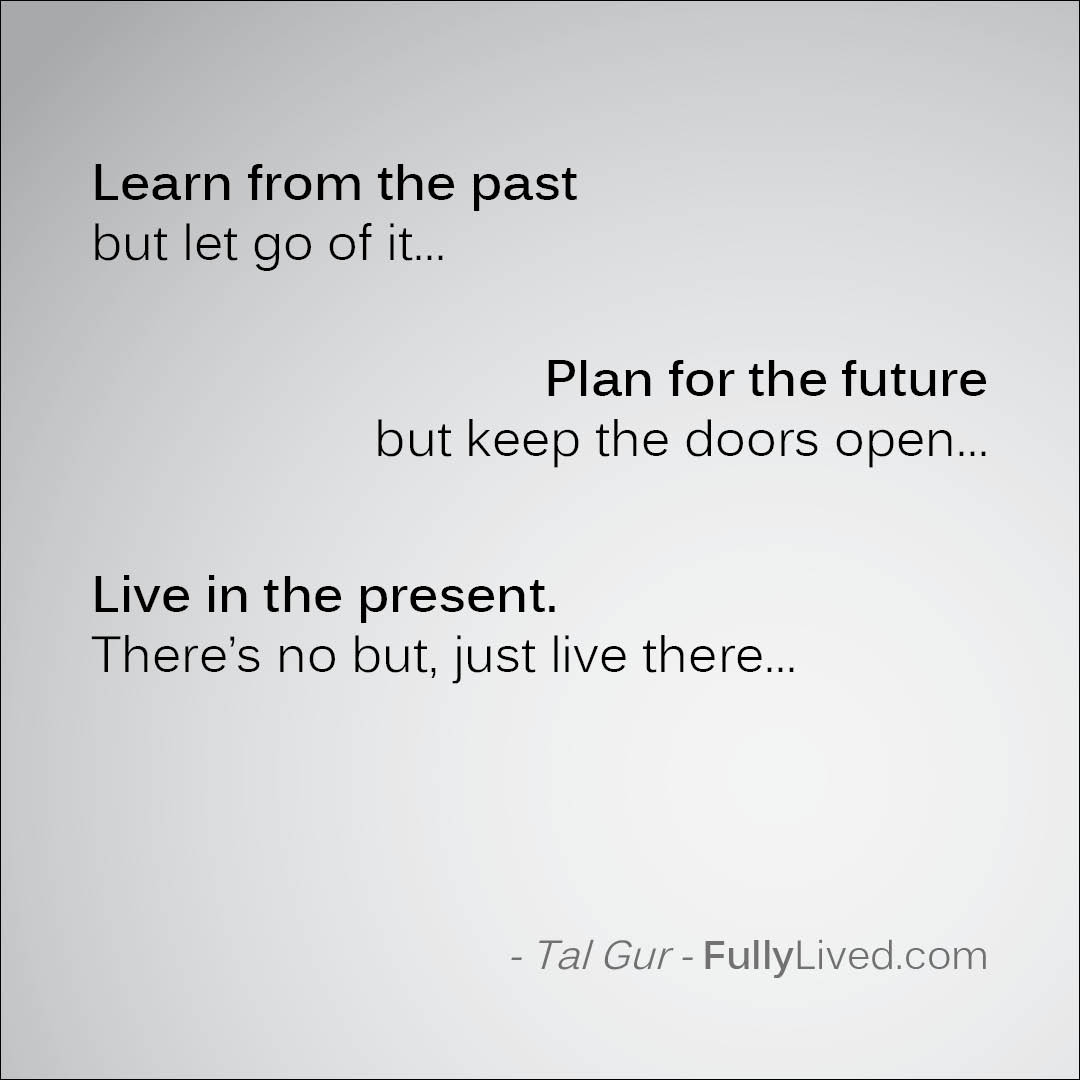Learn from the past but let go of it.. Plan for the future but keep the doors open.. Live in the present. There’s no but, just live there..
The message behind this quote is all about finding a balance in life and embracing the different aspects of time. It encourages us to draw wisdom from our past experiences, but also reminds us not to dwell on them or let them hold us back. Similarly, it suggests that while it's important to make plans and have goals for the future, we should also remain open to new possibilities and opportunities that may come our way. But most importantly, it emphasizes the significance of living in the present moment, fully immersing ourselves in the here and now.
Imagine life as a journey, with time as the road that stretches out before us. The past is like a signpost on that road, guiding us with the lessons we've learned and the experiences we've gained. It's important to learn from those experiences, to reflect on them and understand how they have shaped us. But dwelling on the past, constantly looking back, is like trying to drive while staring only at the rearview mirror. It prevents us from fully embracing the present and moving forward. So, learn from the past, but let go of it. Use it as a guide, not as a hindrance.
On the other hand, the future is like the destination we hope to reach someday. It's important to have goals, dreams, and plans that give us direction and purpose. They provide us with a sense of anticipation and motivate us to strive for something greater. However, it's essential to keep the doors open, to remain flexible and adaptable. Life has a way of surprising us, offering unexpected turns and opportunities that we might not have anticipated. By staying open to these possibilities, we allow ourselves to explore new paths and discover unforeseen joys and achievements.
But amidst our reflections on the past and our aspirations for the future, we must not forget the most valuable and fleeting moment of all—the present. The present is where life happens. It's where we breathe, feel, and experience the world around us. It's the only moment we truly have control over. While the past and the future are important in their own ways, they don't exist tangibly. The present is all that's real. So, when you find yourself caught up in thoughts of the past or worries about the future, gently remind yourself to return to the present.
There's no "but" when it comes to living in the present. It's not about striking a compromise between the past, future, and present. Instead, it's about fully immersing yourself in the present moment, embracing the here and now with all your senses. It's about finding joy in the simplest of things, appreciating the beauty around you, and connecting with the people in your life. When you live in the present, you engage in a deeper and more meaningful way with the world and with yourself. You savor the richness of life, unburdened by regrets or anxieties.
So, learn from the past, but let go of it. Plan for the future, but keep the doors open. But when it comes to living, just be present—fully and completely.
Is there a historical example that illustrates the message of the quote?
One possible historical figure whose life and teachings embody the essence of the quote is the Zen master Dogen (1200-1253), the founder of the Sōtō school of Zen Buddhism in Japan. Dogen emphasized the practice of zazen, or seated meditation, as a means to cultivate mindfulness and fully engage with the present moment. He encouraged his followers to let go of attachments to the past and future, and instead, focus on experiencing reality as it unfolds in the present.
Dogen's teachings and writings, particularly his major work called "Shōbōgenzō" (Treasury of the True Dharma Eye), emphasize the importance of being fully present in each moment and not being burdened by regrets about the past or anxieties about the future. He encouraged individuals to embrace the impermanence of existence and to cultivate a deep appreciation for the present moment.
While Dogen's teachings primarily focus on spiritual enlightenment, they also carry practical implications for daily life. By letting go of the past, planning for the future without excessive attachment, and embracing the present moment, individuals can develop a greater sense of contentment, clarity, and openness to new experiences.
* To gain more inspiration and motivation for your personal growth journey, I recommend visiting my SMART goals page, which offers a wide range of goal ideas to help you establish new aspirations and achieve greater success in life. This list was crucial in the development of my own life goals list, consisting of 100 goals that I pursued for ten years.
Chief Editor
 Tal Gur is an author, founder, and impact-driven entrepreneur at heart. After trading his daily grind for a life of his own daring design, he spent a decade pursuing 100 major life goals around the globe. His journey and most recent book, The Art of Fully Living, has led him to found Elevate Society.
Tal Gur is an author, founder, and impact-driven entrepreneur at heart. After trading his daily grind for a life of his own daring design, he spent a decade pursuing 100 major life goals around the globe. His journey and most recent book, The Art of Fully Living, has led him to found Elevate Society.




















